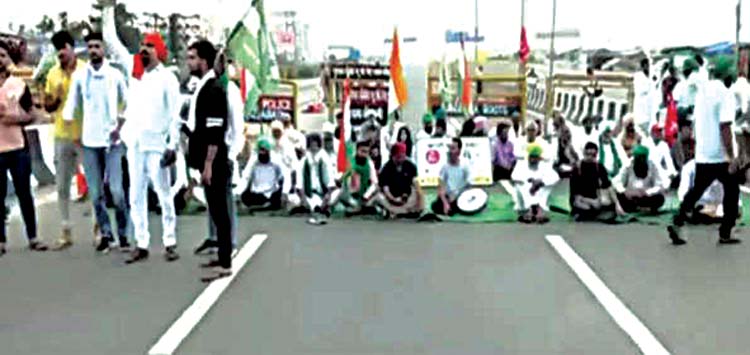Bharat Bandh:Transport affected;shops, institutions shut in parts of country, heavy security in Delhi
New Delhi, Sep 27 (FN Agency) Transport was affected and several institutions remained closed in parts of the country as a call for a Bharat Bandh was given by Samyukt Kisan Morcha, an umbrella body of farmer groups that are protesting against the new farm laws. The Bharat Bandh, the call for which was given on September 5 at a farmers’ Mahapanchayat in Muzaffarnagar, has been called against the Farm Laws, as a part of the agitations that have now been going on for over a year. The call has also received support from several political parties including the Congress, Samajwadi Party, TDP, JD(S), Shiv Sena, NCP, DMK, YSRCP, JMM, RJD, Swaraj India and left parties including CPI-M, CPI, and CPI-ML (Lib). Congress leader Rahul Gandhi supported the Bharat Bandh and said, “Farmers’ non-violent satyagraha is intact even today but the exploitative government does not like this and that is why today is Bharat Bandh.”
The Samyukt Kisan Morcha, in a statement called the support to the Bandh ‘unprecedented’, and said the call got extensive support in Punjab, Haryana, Kerala, Bihar, Rajasthan, Uttar Pradesh, Uttarakhand, West Bengal, Telangana, Andhra Pradesh, Maharashtra, Tamil Nadu, Karnataka and Madhya Pradesh. In the national capital Delhi, where farmers have been camping at the borders since November last year against the Farm Laws, farmers blocked roads close to the protest sites at Singhu border, and Ghazipur border. Police meanwhile shut the road near the Red Fort, and some metro stations were also closed. A protest was held at Jantar Mantar by the trade-unions which remained peaceful. In Bihar, the call for the Bandh was supported by all Opposition parties including the Rashtriya Janata Dal, Congress, and Left parties. Several roads were blocked and trains were stopped. Protestors took to streets in capital Patna, and in other districts as well. Crucial Gandhi Bridge close to Patna was also blocked by protesters from RJD. In Uttar Pradesh, where the call for this shut down was given from Muzaffarnagar, extra security was deployed ahead of the Bandh.
Impact of the call was higher in the western part of the state where several mahapanchayats of the farmers have been held over the last year. The farmers’ agitation has also emerged as an issue for the upcoming polls, set to be held next year. Samajwadi Party leader Akhilesh Yadav said his party is standing with the farmers. In Andhra Pradesh, the call, supported by the TDP led state government, evoked good response. The bandh was complete and peaceful in Coastal districts in the state, police said. Road and rail traffic was disrupted in both Punjab and Haryana as farmers blocked national highways, state highways, link roads and railway tracks at various places. Reports said a complete shutdown was observed at several places in Punjab, which has been the epicenter of the farmers’ protests. In Kerala, both ruling Left Democratic Front (LDF) and Opposition Congress-led United Democratic Front (UDF) extended their support to the agitation.
The LDF called for a state-wide hartal in support of the Bandh. In view of the strike, Kerala University postponed all the examinations scheduled to held on Monday. All emergency and essential services including Ambulance services were exempted from the shut down. In Tamil Nadu, even though ruling DMK and allies supported the Bandh, normal life remained unaffected and the Bandh evoked little response. While protests were held at several locations, including rail and road blocks, buses plied as usual, shops and commercial establishments remained open, and schools and colleges functioned normally across the state. In West Bengal, protests were held, but normal life remained largely unaffected, and shops and commercial establishments remained open. In Maharashtra, ruling alliance of Shive Sena, Congress and NCP supported the Bandh. In Tripura, shops remained shut and streets were empty in capital Agaratala. The call for the Bandh was given to mark one year of President Ram Nath Kovind’s assent to the three Farm Laws.

